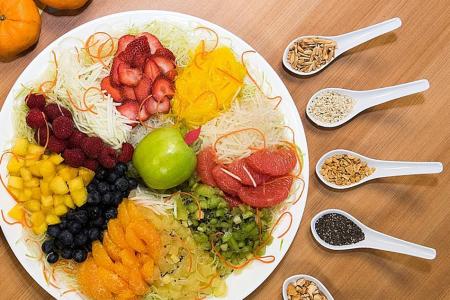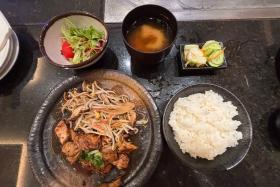Toss out diabetes and more with fruity yusheng
Change some ingredients to make yusheng healthier, especially for diabetics
Around this time every year, Chinese New Year goodies such as pineapple tarts, love letters and bak kwa top the list of unhealthy snacks.
One festive staple that rarely features on any such list is yusheng.
Yet the raw fish salad can easily add up to more than 500 calories per serving and is particularly dangerous for those with diabetes, according to Singapore-based Filipino nutritionist and Cold Storage manager Christine Rubi-Cruz.
Yusheng's main ingredients - vegetables, spices and seeds - are healthy, she said.
The unhealthy culprits are oil, plum sauce and deep-fried shrimp crackers.
"Add those together and you've got one high-fat, high-sugar dish on your plate," Ms Rubi-Cruz, 35, told The New Paper.
"This makes the dish tasty but easy to overeat, especially if you are not so conscious about how much you are having. For diabetics, this means there is a tendency to over-eat, which can have a rapid impact on blood sugar levels."
A healthy alternative to consider is a fruit yusheng, she suggested. Replace the plum sauce with passion fruit, or a lime and honey concoction, and use crushed nuts, chia seeds or sesame seeds in place of crackers.
Add those together and you've got one high-fat, high-sugar dish on your plate. Nutritionist Christine Rubi-Cruz on how oil, plum sauce and deep fried prawn crackers can make yusheng an unhealthy CNY dish
You can also use julienned guava, green Thai mango or pear, peeled grapefruit or orange, diced kiwi or peaches and an assortment of berries.
Fruits like these are naturally sweet, so less dressing is needed to sweeten the dish.
These also have a low to medium glycemic index and can help fight diabetes. That means they are more slowly digested and metabolised, which will cause a lower and slower rise in blood sugar levels, said Ms Rubi-Cruz.
Conversely, food with a high glycemic index quickly raises a person's blood sugar level and causes subtle short-term effects, like unwanted hunger pangs and overeating.
"This increases weight gain, and the risk of diabetes and heart diseases in the long run," said Ms Rubi-Cruz, who warned that overripe fruits should be avoided since their glycemic index usually increases as they ripen.
Some folks may worry that this fruit version changes the meaning of a typical Chinese New Year lo hei.
Traditionally, the plum sauce represents a Chinese proverb that talks about a desire for stronger ties with family and friends, and the deep fried crackers symbolise great wealth.
"Abundance can be linked to anything that resembles gold or red colour. In this case, orange bits or grapefruit slices can symbolise that," said Ms Rubi-Cruz.
Raw fish slices can still be added to the yusheng, as long as it is sashimi-grade fish, like Froya's Sushi Grade Salmon, which is available at Cold Storage outlets.
This means the fish is at its peak freshness and its quality is maintained.
For a vegetarian platter, sliced abalone mushrooms, which symbolise prosperity, can act as a substitute for seafood.
"Normal yusheng is high-fat and high-sugar, and is often served with other generous dishes at festive social gatherings," said Ms Rubi-Cruz.
"A platter of freshly-made fruit yusheng can be a welcome part of a celebration.
"There is always a first time for everything."
Get The New Paper on your phone with the free TNP app. Download from the Apple App Store or Google Play Store now



